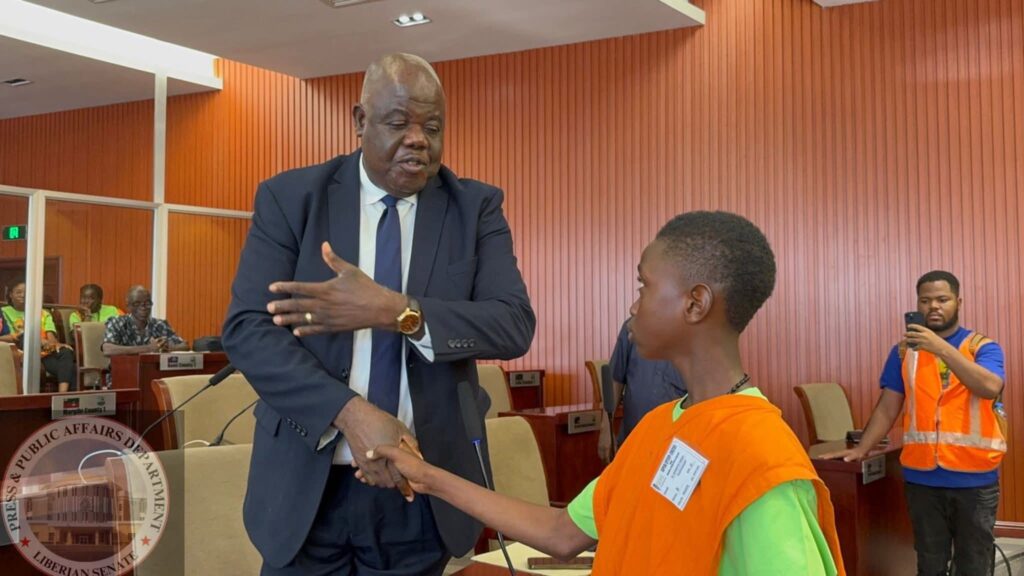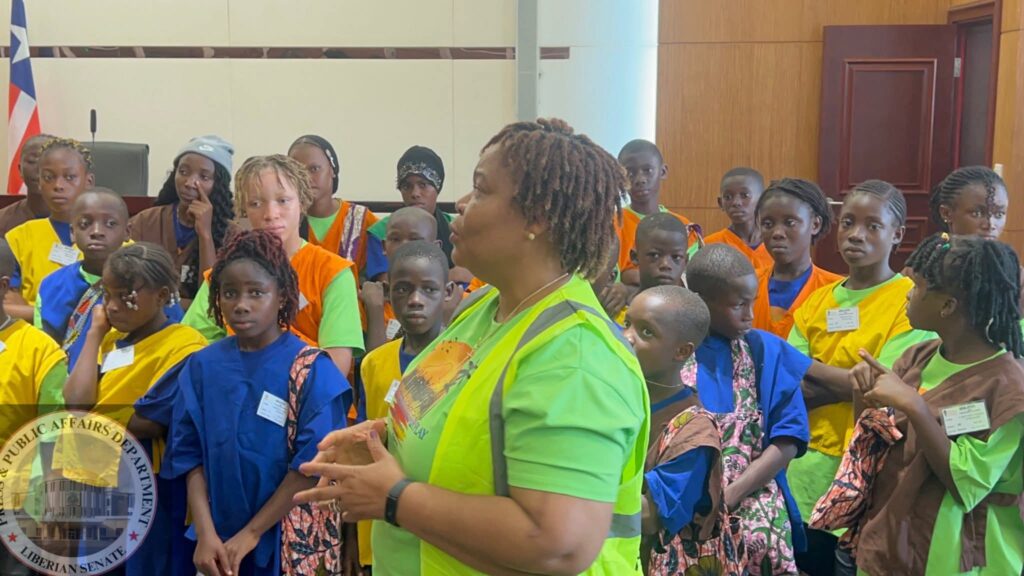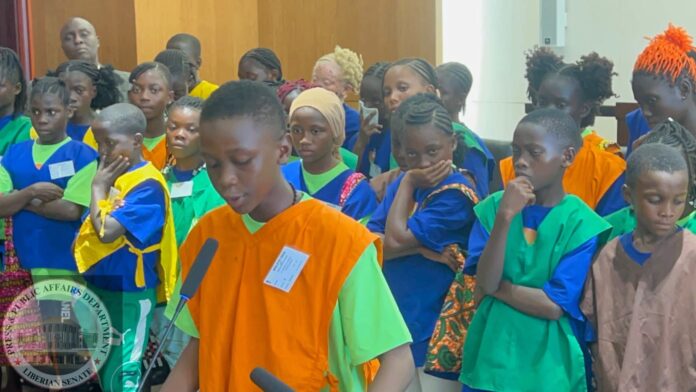Monrovia, Liberia – In a heartfelt and thought-provoking address, N. Kenneth Weah, a student from Our Lady of Fatima High School in Harper, Maryland County, stood before an audience of senators, trustees, and civil society leaders as the voice of youth from Liberia’s Southeastern region.
Representing participants of the 2025 Peace Through Fair Play (PTFP) Camp hosted by the Gbowee Peace Foundation Africa (GPFA), Weah called on national leaders to hear the urgent concerns of children from Grand Kru and Maryland counties.
Held in Monrovia and powered by Nobel Peace Laureate Leymah R. Gbowee’s foundation, the PTFP Camp brings together young minds to foster peace, leadership, and civic engagement. But Weah’s message went beyond appreciation—it was a direct, evidence-based appeal to Liberia’s lawmakers to act on persistent structural deficits affecting the nation’s most vulnerable communities.
A Thank You—and a Wake-Up Call
Weah began his statement by expressing gratitude to GPFA and Liberia’s legislature for making development strides in roads, education, and public health. Acknowledging the impact of these efforts, he was equally clear-eyed about their limitations. Children in the Southeast, he said, still walk more than five kilometers to reach school. Many schools are without qualified teachers, adequate learning materials, or science laboratories.
“We are not just campers; we are the voices of children from the Southeastern Region,” Weah declared. “We want to share our real-life struggles and dreams so that you understand what we face every day.”
The Four Pillars of Youth Concern: Education, Health, Employment, and Justice
Weah’s speech highlighted how Liberia’s uneven educational landscape disadvantages rural students. He described overcrowded classrooms and the long distances students travel, particularly in Maryland and Grand Kru, to reach the nearest functioning school.
The absence of science labs and learning materials, he warned, limits student potential and undermines national development. Investing in education—hiring trained teachers, upgrading school facilities, and providing modern textbooks—was a central demand to the legislature.
A Fragile Health System
Health facilities, Weah emphasized, are scarce and ill-equipped. In times of illness, families are forced to travel great distances to Monrovia or Buchanan for basic medical services. The lack of qualified personnel and the shortage of vaccines and medical supplies was painted as a matter of life and death.
He proposed a concrete solution: expand community-based clinics and increase logistical support for mobile health teams to reach remote villages. “Make it easier for mobile health teams to reach remote villages,” he urged.
Job Insecurity and Its Domino Effects
Acknowledging the economic reality of his community, Weah explained that most parents are subsistence farmers or informal traders with unstable incomes. This results in school dropouts due to unpaid fees and unmet household needs.

The call here was strategic: create vocational training programs and support small-scale local enterprises. By empowering parents economically, Weah suggested, children’s education and well-being would improve significantly.
Justice and Protection
Perhaps the most sobering part of the speech touched on the lack of access to justice. Families in rural areas often have no nearby police stations or functioning courts. This absence of legal infrastructure leaves communities vulnerable, with children and families feeling “unsafe or helpless.”
Weah called on lawmakers to expand the justice sector to remote counties. “Without strong justice systems,” he warned, “we are left in silence.”
A Call to Action, Not Charity
What made Weah’s remarks particularly impactful was his tone—respectful yet assertive. He was not begging; he was advocating. His plea was not for charity, but for a more equitable Liberia where rural and urban children share the same rights and opportunities.
His final appeal to lawmakers underscored a deep sense of national unity and purpose: “We hope you will remember our voices and do everything possible to address these needs, especially keeping our country peaceful so that we can grow up safely together.”
The Role of GPFA and Civic Platforms
That such a powerful message came from a youth participant in the Peace Through Fair Play camp underscores the value of initiatives like those spearheaded by Leymah Gbowee and GPFA. These platforms not only provide young people with leadership skills but also give them a seat at the table where real policy discussions happen.

By focusing on leadership, teamwork, and decision-making, the GPFA is not just shaping the next generation—it is enabling them to challenge the current one to do better.
The Future Is Now
Weah ended his speech with a reminder that echoed through the halls of the Capitol: “We pray for a better, peaceful, and successful Liberia because the future is now!”
That message—simple yet powerful—challenges Liberian leaders to respond with more than applause. It calls for legislative action, budgetary prioritization, and an inclusive development agenda that centers children not as passive beneficiaries but as active agents of change.
Whether the Senate will heed these voices remains to be seen. But one thing is certain: the future is already speaking.



